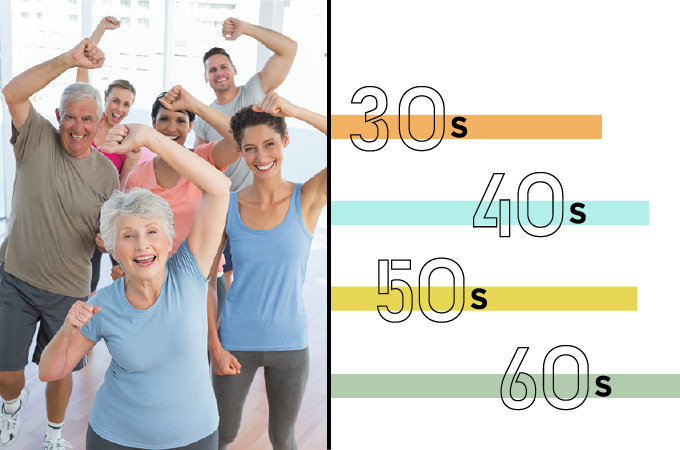It’s no secret that our bodies change as we get older. Each decade brings with it new health concerns and specific needs for wellness. It may be impossible to turn back the clock, but you can keep yourself healthy and strong. Along with regular health screenings, the right diet and fitness routine can help you make the most of this year and many more to come.
30s
diet
With growing career and family responsibilities, your 30s can be a hectic time, but don’t be tempted by the ease of processed food and let a balanced diet slip through the cracks. Consider prepping meals on the weekend for busy weeknights, and keep your fridge stocked with fresh, healthy options. Here are some key nutrients to include
on your plate:
>> B vitamins: These help you convert carbohydrates to glucose to keep you energized. They also are linked to reduced risk of heart disease, boost your immune system and are essential for prenatal health—folic acid is vitamin B9. legumes • lean meats • poultry • nutritional yeast • nuts and dairy
>> zinc: The mineral is important for reproductive health and also helps strengthen your immune system. seafood • pumpkin seeds • red meat
>> vitamin C: Support your adrenal glands, and keep your immune system in tip-top shape. cherries • berries • pineapple • cauliflower • brussels sprouts • tomatoes
>> potassium: Eat for your heart. Potassium can help lower blood pressure. leafy greens • bananas • sweet potatoes • beans
exercise
>> go hard: High-intensity interval training (HIIT) workouts have been shown to be more effective than prolonged cardio-only training. Alternate 20 seconds of all-out, intense work (doing anything from burpees to sprints) with 10 seconds of rest for eight total rounds. It takes just 4 minutes, and it’s good for your heart health.
>> the weight of things: Muscle declines with age, and you start losing it in your 30s. Combat the natural process by lifting weights at least twice a week.
>> a body in motion: Make sure you are exercising your full range of motion. This will help you build stronger, more metabolically active muscles and keep you less prone to injury.
tests & screenings
>> pap tests: Women between the ages of 30 and 65 who have had negative Pap test results in the past should get one every five years.
>> cholesterol screening: The Centers for Disease Control and Prevention (CDC) estimates that 95 million adults in the U.S. have high cholesterol, but the condition doesn’t have any symptoms. It’s recommended cholesterol testing be done every five years.
>> blood pressure: The American Heart Association recommends checking for high blood pressure every two years.
40s
diet
Your risk of diabetes, cancer and heart disease increases in your 40s. Make disease prevention part of your diet by bumping up your daily intake of fruits and vegetables. As you get older, you’re also going to feel the effects of alcohol more (including more severe hangovers), so make sure you are imbibing responsibly. Other important additions:
>> protein: It helps you maintain energy and supports collagen and the growth and repair of cells. poultry • lean meats • legumes • eggs • fish • gelatine
>> fiber: It supports the good bacteria in your gut, removes toxins and assists with healthy hormones. fruit • vegetables • chia seeds • psyllium • whole grains like oats,
bran and brown rice
>> magnesium: It supports cellular health, maintains a healthy nervous system, encourages normal muscle function, is good for your heart and preserves strong bones. leafy greens • dark chocolate • nuts • seeds
exercise
>> be consistent: As we age, lower muscle mass means a slower metabolism, which in turn means weight gain and increased risk for certain health conditions. Having a regular exercise routine can help combat these changes and keep fat gains minimal while preserving lean muscle mass.
>> function first: Functional strength training doesn’t just focus on exercising an isolated muscle group. Focus on building muscle groups you use every day with free weights, medicine balls and kettlebells.
>> keep it flexible: Flexibility can reduce risk of injuries, improve balance and prevent back pain. Make stretching a priority, and favor moving while you stretch (dynamic stretching) over just holding a position for 10 or more seconds (static stretching). Also consider self-myofascial release with foam rollers or massage sticks.
tests & screenings
>> mammogram: Starting in your 40s, annual tests are recommended until age 55, when women can transition to screening biennially. Depending on family history, your doctor may recommend starting earlier.
>> stress echocardiogram: You doctor may recommend this noninvasive test to check for signs of heart disease, especially if you have unexplained chest pain or shortness of breath.
>> diabetes screening: The American Diabetes Association recommends blood tests for diabetes in any person with symptoms of the disease. In people without symptoms, testing should begin at age 45 if they have common risk factors, including family history, heart disease and obesity.
50s
diet
In your 50s, hormonal changes impact the health of your brain, bones and heart. Help keep everything running smoothly by making smart choices with what you eat.
>> good fats: These have myriad benefits, from building healthy hair and nails to supporting brain health and hormone production. oily fish like salmon • sardines • chia seeds • walnuts • flaxseed avocado • olive oil
>> calcium: Loss of bone mass is a major change as you age. To keep your bones healthy and strong, eat three servings of calcium-rich foods daily. milk • yogurt • salmon • leafy greens
>> vitamin D: Without it, your body can’t absorb calcium, but it can be difficult to get it through food alone. Discuss the option of a supplement with your doctor. fortified milk • fatty fish • mushrooms • cheese
>> phytoestrogens: For women going through menopause, plant-based estrogen has been shown to reduce the frequency of symptoms like hot flashes. tempeh • soy oats • lentils • barley • sesame seeds • alfalfa
exercise
>> perfect posture: You may notice your shoulders starting to hunch forward. Save your back and strengthen your core muscles by taking up yoga or Pilates.
>> listen to your body: Soreness and fatigue are more common now after working out, so alter your routine. If your knees hurt after running, try swimming or riding a bike. Don’t drop the frequency of exercise but go easier than you did in the past.
>> balancing act: Strength training will help improve your balance and prevent falls. This is especially important as bone density decreases and the risk of injury increases.
tests & screenings
>> fecal occult blood test: This checks stool samples for hidden (occult) blood, which can indicate colon cancer or polyps in the colon or rectum.
>> prostate-specific antigen test: It detects the levels of a protein called prostate-specific antigen (PSA) in a man’s blood. It is used to check for prostate cancer, but a high level of PSA can be caused by other conditions as well.
60s and beyond
diet
In your 60s and beyond, you’ll need to consume fewer calories than when you were younger. However, fewer calories shouldn’t mean fewer nutrients. Make sure your diet is still full of the good stuff like B vitamins, calcium and vitamin D, and don’t forget to eat fiber and protein. You also may experience a decreased appetite. To avoid nutritional deficiencies, talk with your doctor about supplements.
>> iron: A deficiency of this mineral is common as people age, and it can cause anemia, meaning your body doesn’t have enough healthy red blood cells. dark chocolate • spinach • tofu • quinoa • broccoli
>> probiotics: A healthy gut microbiome can have big benefits. Taking a probiotic or eating fermented foods can stimulate your immune response and protect against conditions like irritable bowel syndrome, eczema and colds.
>> water: Dehydration can be a major problem as we age. Your body may be less able to recognize the signs, making you more prone to it and side effects like increased fatigue and worsened medical conditions. Carry a water bottle with you, and try to drink two glasses of water with each meal.
exercise
>> better together: Taking classes or going for group walks can help build accountability when it comes to continuing physical activity in your golden years. Plus, working out with others comes with the bonus of social engagement.
>> take to the water: Aquatics is the fitness solution for joint pain and stiffness. The buoyancy of water gives you the benefits of a regular workout without the strain.
>> expert opinion: Work with a professional trainer to make sure you’re exercising properly and avoiding injury. If you experience pain while working out, consult your doctor.
tests & screenings
>> bone density scan: The U.S. Preventive Services Task Force recommends screening for osteoporosis in women 65 and older. While osteoporosis is more common in women, men also should consider getting a bone density scan around age 70.








